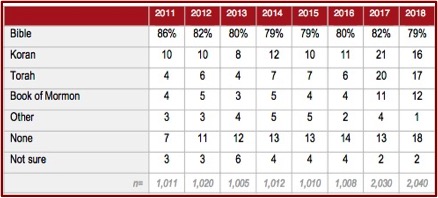
The American Bible Society commissioned the Barna Group to do a nationwide survey on the extent to which American adults are engaged with the Bible. The study used an enhanced definition of “Biblical Engagement” to demonstrate “how consistent interaction with the Bible shapes people’s choices and transforms their relationship with God, self and others.” The study has some interesting findings, including that 79% of all adults consider the Bible to be sacred literature. However, 17% thought the Torah was a sacred book, 16% thought the Koran was a sacred book and 12% thought the Book of Mormon was a sacred book. And 18% thought that none of these four were sacred books or literature.
The above information is found in Table 3.1 on Sacred Literature in “State of the Bible 2018.” Looking further at the data, you can see while belief that the Bible is a sacred text decreased from 86% in 2011 to 79% in 2018, reported belief in the sacredness of the other three texts, the Koran, Torah and the Book of Mormon increased over the same time period. You can see the pattern of change in the following segment taken from Table 3.1.
The Barna Group used an algorithm to sort study participants into five segments of Bible Engagement. They used fourteen different questions (see page 5 of the State of the Bible 2018) to define the five segments. The fourteen questions fell into three categories with the most influence on the concept of Bible Engagement. Those categories were: “Frequency (how often people interact with the Bible), Centrality (how the Bible shapes their choices), and Impact (how the Bible transforms their relationships).” Those who scored the highest on the engagement scale scored high on the combined factors of Bible Engagement, while those who were disengaged scored lowest. The five categories from the highest to the lowest engagement were: Bible Centered, Bible Engaged, Bible Friendly, Bible Neutral and Bible Disengaged.
Bible Centered individuals made up 9% of the population. The Bible Engaged were 17% of the population, while Bible Friendly individuals were 15% of the population. Bible Neutral individuals were 5% of the population and 54% of adults were Bible Disengaged. But the Disengaged were not necessarily hostile or negative towards the Bible. “The Disengaged are primarily classified by their infrequent interaction with the Bible and its minimal impact on their lives.”
There were notable differences in Bible Engagement according to age. For the “State of the Bible Study 2018,” Millennials: were those 19 to 33; Gen X: those currently 34 to 52; Boomers: those currently 53 to 71; Elders: those 72 or older. Bible Centered individuals were most likely to be Gen Xers (35%) or Boomers (38%). Disengaged individuals tended to be Gen Xers (35%), followed by Boomers (29%) and Millennials (26%). Neutrals were most likely to be Millennials (37%), followed by Gen Xers (30%) and Boomers (26%). See the following chart from the study.
 Bible users, meaning they engaged with the Bible on their own outside of a church service at least three or four times a year, made up 48% of the population. This percentage has remained more or less stable since 2011. Fifteen percent of adults use the Bible daily and 13% use it several times a week. Nine percent use it once a week; 6% once a month; and 7% three or four times a year.
Bible users, meaning they engaged with the Bible on their own outside of a church service at least three or four times a year, made up 48% of the population. This percentage has remained more or less stable since 2011. Fifteen percent of adults use the Bible daily and 13% use it several times a week. Nine percent use it once a week; 6% once a month; and 7% three or four times a year.
Four out of five Bible Centered adults use the Bible daily, while another 18% use it at least weekly. One third (33%) of the Bible Engaged adults use the Bible daily, and another 58% use it at least weekly. Daily Bible use dropped to 10% among Bible Friendly individuals, with 51% who used it once or several times a week. No Neutrals reported daily Bible use and 27% reported using it once or several times a week. Not surprisingly, 77% of the Disengaged use the Bible less than once a year or never. See Table 1.2 from the study for more information.
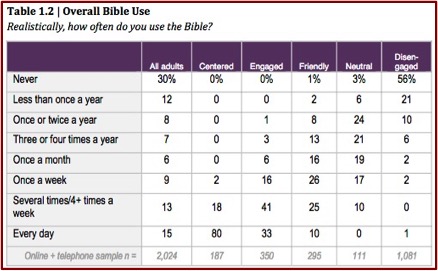 When it comes to beliefs about the Bible, 42% of adults agree strongly that the Bible contains everything you need to know how to live a meaningful life. “The vast majority of Bible Centered (89%) and Engaged (80%) believe this to be true, while about half of those who are Friendly do (54%).” Then agreement drops for individuals classified as Neutral (31%) and Disengaged (19%). “Strong agreement with this statement is most common among Boomers (47%), compared to 42% of Gen X, 37% of Elders, and 34% of Millennials.” Strongly agreeing that, “the Bible contains everything you need to know how to live a meaningful life,” has dropped from 53% for all adults in 2011. See Table 3.1 below from the study.
When it comes to beliefs about the Bible, 42% of adults agree strongly that the Bible contains everything you need to know how to live a meaningful life. “The vast majority of Bible Centered (89%) and Engaged (80%) believe this to be true, while about half of those who are Friendly do (54%).” Then agreement drops for individuals classified as Neutral (31%) and Disengaged (19%). “Strong agreement with this statement is most common among Boomers (47%), compared to 42% of Gen X, 37% of Elders, and 34% of Millennials.” Strongly agreeing that, “the Bible contains everything you need to know how to live a meaningful life,” has dropped from 53% for all adults in 2011. See Table 3.1 below from the study.
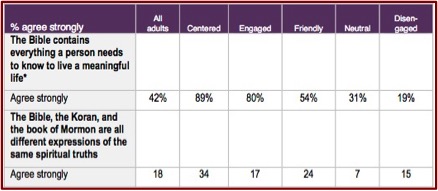 Thirty-two percent of Americans believe the Bible is the inspired word of God and has no errors, while some verses are meant to be symbolic. This compares to 22% who believe it is the actual word of God and should be taken literally, word for word. Another 16% believe the Bible is the inspired word of God, but contains factual or historical errors. When you look at how the different segments of Biblical Engagement view the Bible, Bible Centered individuals are almost even with regard to whether they believe the Bible should be taken literally (48%) or has some symbolic verses (47%). “More than one third of the Disengaged believe the Bible is just another book of teachings written by men with stories and advice.” See Table 4.1 below from the study.
Thirty-two percent of Americans believe the Bible is the inspired word of God and has no errors, while some verses are meant to be symbolic. This compares to 22% who believe it is the actual word of God and should be taken literally, word for word. Another 16% believe the Bible is the inspired word of God, but contains factual or historical errors. When you look at how the different segments of Biblical Engagement view the Bible, Bible Centered individuals are almost even with regard to whether they believe the Bible should be taken literally (48%) or has some symbolic verses (47%). “More than one third of the Disengaged believe the Bible is just another book of teachings written by men with stories and advice.” See Table 4.1 below from the study.
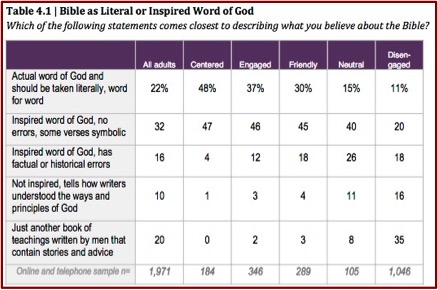 Adults who claim that the Bible is just another book of teachings were asked a follow-up question to determine if they are skeptical about the Bible or if they have a more opposing perspective. A plurality of Disengaged adults, who represent 95% of those believe the Bible is just another book of advice, believe either strongly (44%) or somewhat (34%) that the Bible was written to control or manipulate others. Just 22% of Disengaged adults believe it was not written to control others. [See Table 4.2 from the study].
Adults who claim that the Bible is just another book of teachings were asked a follow-up question to determine if they are skeptical about the Bible or if they have a more opposing perspective. A plurality of Disengaged adults, who represent 95% of those believe the Bible is just another book of advice, believe either strongly (44%) or somewhat (34%) that the Bible was written to control or manipulate others. Just 22% of Disengaged adults believe it was not written to control others. [See Table 4.2 from the study].
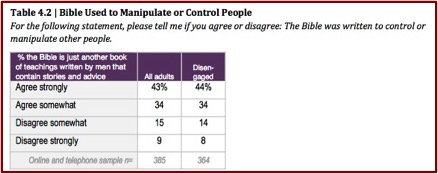 What we’ve reviewed so far suggests while most adult Americans believe the Bible to be sacred literature, the others (the Koran, the Torah and the Book of Mormon) are gaining in their recognition as sacred texts. Individuals who fit within the Bible Centered segment of Biblical Engagement read the Bible more frequently, and are more likely to strongly agree that it contains everything a person needs to live a meaningful life. They also are more likely to say either the Bible is the actual word of God which should be taken literally, word for word; or it is the inspired word of God with no errors but some symbolic verses. Bible Engaged and Bible Friendly persons are less likely to believe the Bible is the actual word of God, which should be taken literally, word for word. But they are equally likely to say it is the inspired word of God with no errors but with some symbolic verses.
What we’ve reviewed so far suggests while most adult Americans believe the Bible to be sacred literature, the others (the Koran, the Torah and the Book of Mormon) are gaining in their recognition as sacred texts. Individuals who fit within the Bible Centered segment of Biblical Engagement read the Bible more frequently, and are more likely to strongly agree that it contains everything a person needs to live a meaningful life. They also are more likely to say either the Bible is the actual word of God which should be taken literally, word for word; or it is the inspired word of God with no errors but some symbolic verses. Bible Engaged and Bible Friendly persons are less likely to believe the Bible is the actual word of God, which should be taken literally, word for word. But they are equally likely to say it is the inspired word of God with no errors but with some symbolic verses.
In Part 2 we’ll look at what the “State of the Bible Study 2018” said about what people believed about how the Bible influences daily life, its impact on thoughts and behaviors, the Bible’s role in US Society, whether the Bible is the moral fabric of our country and belief on the influence of the Bible of social and political issues.

